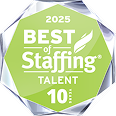Businesses often face considerable difficulty when it comes to finding suitable employees. This challenge stems from a variety of factors, each of which contributes to the complexities involved in recruitment and hiring. Understanding these underlying reasons is crucial for businesses seeking to overcome this hurdle and attract the right talent to drive their success.
Geographic Disparities and Talent Accessibility
One of the primary reasons for the difficulty in finding employees is the mismatch between the skills required by employers and those possessed by potential candidates. Rapid technological advancements and evolving job roles often leave employers struggling to identify individuals with the precise skill set needed to thrive in their organizations. As a result, the talent pool may not always align with the specific demands of the available positions, leading to a prolonged search for suitable candidates. Discover why you can’t afford to wait when you find the right hiring candidate.
Furthermore, the geographic disparities between job seekers and available opportunities can present significant hurdles for businesses. In some regions, there may be an abundance of job seekers but a dearth of job openings, while in others, the situation may be reversed. As a result, businesses located in areas with limited access to talent may encounter substantial challenges in their recruitment efforts, impacting their ability to grow and thrive.
Evolving Expectations of Modern Workers
Another pivotal factor contributing to the difficulty in finding employees is the evolving expectations of modern workers. Today’s employees seek more than just a paycheck; they prioritize factors such as work-life balance, career development opportunities, and a positive company culture. Businesses that fail to address these expectations may find themselves struggling to attract and retain top talent, thereby exacerbating their recruitment challenges.
Challenges in the Recruitment Process
The recruitment process itself can also pose significant hurdles for businesses. Navigating the extensive array of job boards, social media platforms, and professional networks to identify potential candidates can be time-consuming and overwhelming. Additionally, the thorough vetting of applicants to ensure cultural fit and competence requires substantial resources, further adding to the complexity of the recruitment process.
Influence of the COVID-19 Pandemic
Moreover, the lingering impact of the COVID-19 pandemic has reshaped the landscape of talent acquisition. Remote work arrangements, shifting priorities, and the reevaluation of career paths have all contributed to a more discerning and selective hiring base. Businesses are now tasked with adapting their recruitment strategies to accommodate these changing dynamics and appeal to the evolving needs of prospective employees.
Strategic Solutions for Overcoming Recruitment Challenges
To address the challenges of hiring employees, businesses must proactively engage in strategic and innovative solutions. This may involve refining job descriptions to accurately reflect the evolving demands of the role, leveraging data-driven insights to target candidates effectively, and optimizing the candidate experience to enhance the attractiveness of the organization. Additionally, embracing remote work options and flexible schedules can broaden the talent pool by appealing to candidates who prioritize work-life balance.
Elevate your talent acquisition and gain a competitive edge in the recruitment landscape by partnering with a reputable recruitment agency like CulverCareers.





